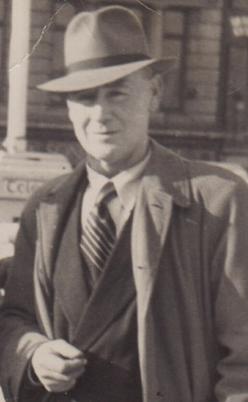Bill Gannon (Irish republican) facts for kids
Quick facts for kids
Bill Gannon
|
|
|---|---|

Bill Gannon in 1954
|
|
| Personal details | |
| Born | 23 June 1902 |
| Died | 12 September 1965 (aged 63) |
| Political party | Communist Party of Ireland |
| Military service | |
| Allegiance | Irish Republic |
| Branch/service | Irish Republican Army Anti-Treaty IRA |
| Battles/wars | Irish War of Independence Irish Civil War |
Bill Gannon (born June 23, 1902 – died September 12, 1965) was an important member of the Irish Republican Army (IRA). He later became a key leader in the Communist Party of Ireland.
Contents
Bill Gannon's Early Life and the IRA
Bill Gannon was a significant figure in Irish history. He was born in 1902 and lived through a time of great change in Ireland. He is remembered for his strong beliefs and his involvement in important political groups.
Fighting for Irish Independence
Bill Gannon fought in the Irish War of Independence. This war was fought from 1919 to 1921. It was a fight for Ireland to become free from British rule.
After this war, Ireland faced another conflict. This was the Irish Civil War, which lasted from 1922 to 1923. In this war, Gannon supported the side that was against the treaty. This treaty created the Irish Free State. Gannon was part of the group that took over the Four Courts building in Dublin.
After the Civil War
When his side lost the Civil War, Bill Gannon was held in prison for a long time. Many others who shared his views were also imprisoned. He was very unhappy with the new Irish Free State government.
While in prison, Gannon and two friends, Archie Doyle and Timothy Coughlin, made a secret plan. They promised to get revenge on those they felt had betrayed Ireland.
Most such plans were stopped by the IRA leaders later on. But Gannon and his friends kept their promise.
The Kevin O'Higgins Event
Bill Gannon became widely known because of the death of Justice Minister Kevin O'Higgins. On July 10, 1927, Gannon and his two friends surprised O'Higgins in Blackrock, County Dublin. They shot him.
Many IRA members strongly disliked O'Higgins. He had ordered the executions of 77 IRA members during the Civil War. He openly said he was responsible for these actions and showed no regret. On December 8, 1922, O'Higgins approved the executions of four important republicans. These included Liam Mellows and Rory O'Connor. This was in response to the killing of a member of the Irish parliament.
The people who planned O'Higgins's death believed it would weaken the new government.
None of the three men were ever caught or charged for O'Higgins's death. Timothy Coughlin was killed in 1928, but the details are still debated. In 1932, Éamon de Valera became leader of Ireland. He gave an amnesty (a pardon) to IRA members. After this, Gannon and Doyle could openly talk about their part in O'Higgins's death without fear of being arrested.
Bill Gannon's Communist Career
By the 1930s, Bill Gannon had become interested in left-wing politics. He became a key member of the Communist Party of Ireland when it was re-established in 1933. His friend, Donal O'Reilly, who had been with him at the Four Courts, had already joined the Communist Party. This may have influenced Gannon's decision.
Being an Irish Communist during these years was not easy. In 1933, Gannon helped defend Connolly House. This was the party's headquarters in Dublin. A large group of right-wing people attacked the building and set it on fire. In the years that followed, Communists often faced harassment and violence.
Helping in the Spanish Civil War
Today, Bill Gannon is mostly remembered for his important role in the Spanish Civil War. He helped organize Irish volunteers to fight for the Republican side. These volunteers were known as the Connolly Column. He worked closely with Frank Ryan and Peadar O'Donnell on this effort. This work became more famous than his earlier involvement in the O'Higgins event.
Bill Gannon passed away on September 12, 1965, at the age of 63. His funeral was well-attended. His coffin was covered with a red flag and the Irish Tricolor flag.
 | Ernest Everett Just |
 | Mary Jackson |
 | Emmett Chappelle |
 | Marie Maynard Daly |

